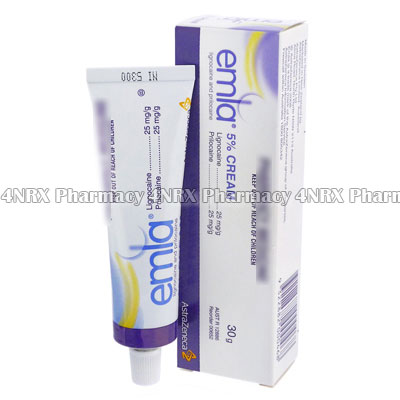 |
Home  Pain Pain  Emla (Lignocaine/Prilocaine) Emla (Lignocaine/Prilocaine) |
|
|||||||||
|
|
Emla (Lignocaine/Prilocaine)
What is Emla (Lignocaine/Prilocaine) used for? Emla (Lignocaine/Prilocaine) is a topical local anaesthetic used to numb the skin prior to minor medical procedures. The medication operates by blocking nerve signals to prevent pain sensations at the area of application. The cream is commonly used just prior to injections, drawing blood, or catheterization. Your doctor may also recommend its use for the treatment of other unlisted conditions. How should I use Emla (Lignocaine/Prilocaine)? Emla (Lignocaine/Prilocaine) should be used according to your doctor`s instructions and those included with the packaging to get the safest and most effective results from treatment. The cream is normally administered just prior to a medical procedure, but your particular directions will depend on the specific condition being treated. Thoroughly rinse the area being treated before application to remove any dirt or loose skin. Apply a small amount of cream to the area, gently massage it into the skin, and leave it uncovered allowing any excess medicine to evaporate. You are recommended to wear latex gloves when using the cream to prevent it from numbing your fingers or hand. Wash your hands using soap and water after each use to make sure the medicine does not contact any areas not being treated or the mucous membranes. Ask your doctor any questions you have about the medicine to ensure the correct administration. What are the side effects of Emla (Lignocaine/Prilocaine)? The use of Emla (Lignocaine/Prilocaine) may lead to side effects in some patients including:
Stop using the medicine and contact your doctor as soon as possible if any worrying or intense side effects occur such as bruised appearance of the skin, severe stinging or burning sensations, severe drowsiness, dizziness, swelling, or intense cold or heat sensations. These conditions may require reduced dosages, reduced frequency of administration, or emergency medical attention in serious cases to prevent further health problems from occurring. Please Note Emla (Lignocaine/Prilocaine) should not be applied to broken or damaged skin, cuts, rashes, wounds, or eczema. It should not be used to treat babies under twelve months old, allergic to other anaesthetics, or who have had a bad reaction to similar treatments in the past. Also inform your doctor if you have anaemia, atopic dermatitis, a G6PD deficiency, methaemoglobinaemia, or who are taking medications to treat an irregular heartbeat. These conditions may cause unexpected health problems requiring special adjustments to your treatment. Strictly use Emla (Lignocaine/Prilocaine) as prescribed and follow all instructions provided by your doctor. Safe, suitable, and optimum dosage can vary and is dependent on the patient`s health and medical history, as well as the condition you are treating. Emla (Lignocaine/Prilocaine) may not be safe or suitable for all patients. Always ensure your doctor is informed if you are pregnant or breastfeeding, using any other type of medication (including non-prescription medicine, vitamins, and supplements), as well as if you have any allergies, other illnesses, or pre-existing medication conditions. Seek immediate medical attention or proceed to your nearest accident and emergency department if you suffer a hypersensitive or allergic reaction. Symptoms usually present during a reaction of this nature include difficulty breathing or swallowing, swelling of the limbs or face, tight chest, hives, and skin rashes. 
|
||||||||||||||||||